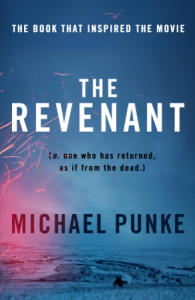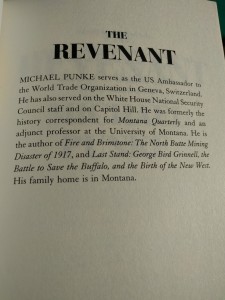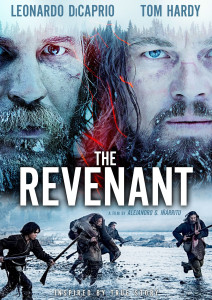The Revenant by Michael Punke
 The Revenant ( 2001) written by Michael Punke is tipped to win a few Oscars tonight ( 2016). It has been nominated for 12 Academy Award nominations across all categories including the Best Actor for Leonardo DiCaprio — probably his first in twenty years of being in the movie business. ( http://www.theguardian.com/film/2016/feb/26/leonardo-dicaprio-the-revenant-oscars-academy-award ). I have not seen the film but the book is brutally magnificent and mesmerising with its focus on one man’s quest for revenge. It is powerful. Set in the American wilderness in the early 1800s, frontiersman Hugh Glass is badly mauled by a grizzly and abandoned by his fellow trappers ( intensely described in the stomach churning opening pages of the novel). Barely surviving his wounds, Glass is driven by thoughts of his family and a desire for revenge as he endures the frigid winter and pursues the men who left him for dead.
The Revenant ( 2001) written by Michael Punke is tipped to win a few Oscars tonight ( 2016). It has been nominated for 12 Academy Award nominations across all categories including the Best Actor for Leonardo DiCaprio — probably his first in twenty years of being in the movie business. ( http://www.theguardian.com/film/2016/feb/26/leonardo-dicaprio-the-revenant-oscars-academy-award ). I have not seen the film but the book is brutally magnificent and mesmerising with its focus on one man’s quest for revenge. It is powerful. Set in the American wilderness in the early 1800s, frontiersman Hugh Glass is badly mauled by a grizzly and abandoned by his fellow trappers ( intensely described in the stomach churning opening pages of the novel). Barely surviving his wounds, Glass is driven by thoughts of his family and a desire for revenge as he endures the frigid winter and pursues the men who left him for dead.
The author, Michael Punke, is a serving international trade expert and diplomat. He  serves as the US Ambassador to the World Trade Organisation in Geneva, Switzerland. The Quartz profiled him: http://qz.com/626726/the-author-behind-the-revenant-is-an-international-trade-expert-and-diplomat/. This is what they say, “Despite the press frenzy ahead of Sunday’s Academy awards, Michael Punke can’t give interviews about his book or make promotional appearances due to his government position. He skipped the film’s December premiere to negotiate a $1.3 trillion trade deal in Nairobi. He can’t even sign copies of his 2002 novel.”
serves as the US Ambassador to the World Trade Organisation in Geneva, Switzerland. The Quartz profiled him: http://qz.com/626726/the-author-behind-the-revenant-is-an-international-trade-expert-and-diplomat/. This is what they say, “Despite the press frenzy ahead of Sunday’s Academy awards, Michael Punke can’t give interviews about his book or make promotional appearances due to his government position. He skipped the film’s December premiere to negotiate a $1.3 trillion trade deal in Nairobi. He can’t even sign copies of his 2002 novel.”
According to Wikipedia, the word revenant is derived from the Latin word reveniens, “returning” (see also the related French verb revenir, meaning “to come back”). A revenant is a visible ghost or animated corpse that is believed to have returned from the grave to terrorize the living. Revenants share some similarities with zombies in modern fiction. This is a result of contemporary depictions of zombies having evolved from vampire fiction. The original folklore about zombies had less in common with revenant legends. Similarities are also obvious with the aptrgangr (literally ‘again-walker’, meaning one who walks after death) of Norse mythology, although the aptrgangr, or draugr, is usually far more powerful, possessing magical abilities and most notably is not confined to a deathlike sleep during the day – although it does usually stay in its burial mound during the daylight hours – and will resist intruders, which renders the destruction of its body a dangerous affair to be undertaken by individual heroes. Consequently, stories involving the aptrgangr often involve direct confrontations with the creature, in which it often reveals to be immune to conventional weapons. Such elements are absent from the revenant lore, where the body is engaged in its inert state in daylight, and rendered harmless. Also references of revenant-like beings come from the Caribbean and are often referred to as ‘The soucouyant’ or ‘soucriant’ in Dominica, Trinidadian and Guadeloupean folklore (also known as Ole-Higue or Loogaroo elsewhere in the Caribbean).
 The last time a film based on a book written by a serving diplomat won many Oscars was Slumdog Millionaire (2008), based on Vikas Swarup’s Q&A ( 2005). He is now the official spokesperson of the Ministry of External Affairs, Government of India (2016).
The last time a film based on a book written by a serving diplomat won many Oscars was Slumdog Millionaire (2008), based on Vikas Swarup’s Q&A ( 2005). He is now the official spokesperson of the Ministry of External Affairs, Government of India (2016).
Michael Punke, The Revenant HarperCollins India, 2016. Pb.
28 Feb 2016


